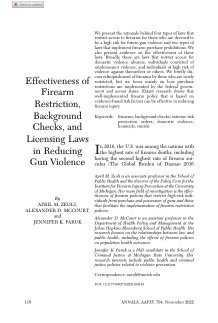By Everytown Research & Policy
he intersection of gun violence and domestic violence has a devastating impact on families and communities across the country, with an average of 76 women in the United States shot and killed by an intimate partner every month, and many more shot and wounded. It is therefore crucial for law enforcement to be vigilant about recognizing warning signs of potential lethal violence by abusers, and to implement policies that help prevent this violence rather than only responding after a tragedy occurs.
One key piece of information that law enforcement should take seriously as a potential warning sign of future violence is a report that an individual who is barred from gun possession because of a disqualifying domestic violence-related conviction or restraining order has attempted to purchase a gun in violation of the law. As the result of a new federal law enacted in 2022, the NICS Denial Notification Act, state and local law enforcement are now notified—within 24 hours—every time a prohibited domestic abuser attempts to buy a gun and fails a background check. But in most states, there is no policy in place to follow up in these cases to investigate whether the survivor of abuse is in imminent danger.
Everytown for Gun Safety obtained data from the FBI that reveals a stunning reality: every year thousands of prohibited abusers attempt to purchase guns and are prevented from doing so because of the background check system: From 2018 through 2022, 135,243 background checks were denied because the purchaser was a prohibited domestic abuser. While this is an example of the background check system working as designed to prevent gun sales to prohibited individuals, each of these cases also raises a new red flag about a potential risk of violence and presents an opportunity to intervene and prevent future homicides of women by an intimate partner.
In light of the significant risk of future violence by domestic abusers with firearms, federal, state, and local law enforcement agencies should implement a policy of investigating each of these cases as part of a proactive approach to preventing gun violence. This type of investigation should include assessing whether there are other risk factors of imminent violence, determining whether the individual has unlawfully obtained firearms through other means, following up with the individual to reiterate that they are prohibited from buying and possessing firearms, and working with victims’ services staff and local domestic violence service providers to notify the survivor that the abuser has attempted to purchase a gun and offer assistance with safety planning. In addition, appropriate cases should be referred to prosecutors for further investigation into whether criminal charges should be pursued for the unlawful attempted gun purchase.
New York: Everytown Research & Policy, 2024 11p.









